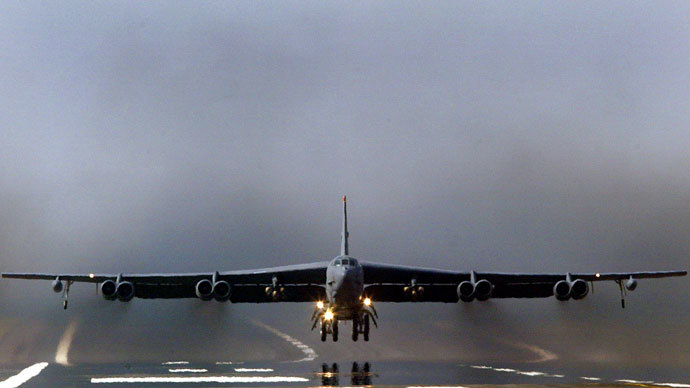'The US fears China - no one in China fears the US'

You may think what you want, but the latest US diplomacy response to send two B-52 Bombers over China’s new ‘East China Sea Air Defense Identification Zone’, unannounced and uninvited, doesn’t exactly give much respect to China’s Ministry of Defense.
About deep sea oil and national spirit
The flights took place over the disputed Senkaku/Diaoyutai islands, a pile of uninhabited rocks pounded by rough seas. The territory is claimed by both Japan and China. It’s about deep sea oil, some economists say, but it’s much more about national spirit. So which side is right?
Tokyo evidently started a chain reaction last year by acquiring the islands from a private owner. Beijing, which had previously mentally shelved the dispute, immediately retaliated with the greatest national boycott of Japan since then Prime Minister Koizumi visited the Yasukuni War Shrine in September 2012. Truth be told, the islets are of little value. It’s the surrounding sea which matters: it’s China’s eastern passage to the Pacific Ocean, which Japan would love to govern.
B-52 Bombers - frightening hulks of metal
Meanwhile the US, which still occupies Japan, has almost 50,000
troop stationed on Okinawa and elsewhere. Washington saw the
necessity to remind all its semi-colonies and satellite states in
East and South Asia that it is still the world’s strongman.
In the future, the mere mention of any national defense airspace
will encourage the US military to fly right through it. (We are
seeing this with US drones in Pakistan and Iran.) And in case you
haven’t seen one, these bombers are truly frightening hulks of
metal. Japan still remembers the older B-29 model, two of which
dropped atomic bombs on Nagasaki and Hiroshima.
The story may even have the potential to inspire a new internet
meme: The US might want to dispatch unarmed bombers for Christmas
over protests in Xinjiang or Tibet.
China versus the USA
What does all this travesty of power mean? Most analysts agree
that China is going to overtake the United States in terms of
economic might this decade or the next. That shift, commentators
predict, is going to be very dramatic; it’s like losing your job,
your status, your self-confidence. Some worry that the US Empire
is going down in Hollywood fashion, with a few more explosions
here and there.
Already degraded to its new role as the antagonist in history (China now being the protagonist), Washington still thinks it possesses a time machine called ‘pre-emptive action’: some US politicians wish to change the future by preemptively striking out at China now – while it’s still somewhat fragile and weak.
That’s understandable, even justifiable. From an ethical point of
view, however, there is probably only one way to go about a
benign competition: China as the new contender has the moral
obligation to challenge the current world champion and, if it
can, replace the US as the world’s leading superpower. If not,
well, we’d still admire its courage. And the US, vice versa, has
the moral obligation to accept the challenge and deliver a fair
fight and no dirty tricks.
The world is watching. If either China or the US fails its moral obligations, few nations are going to respect them in the future.
Old champ keeps plugging away belligerently
With more than 178 wars and military interventions on its record, the United States is the experienced old imperialist that has everything to lose. Naturally, it fears China. No one in China, however, fears the US. That’s why, perhaps, the US feels it has to parade its military capacity to bomb China.
What signals does bomber-diplomacy send to Russia, Iran, India, Japan, China, and Europe? Everyone feels that the US, like most empires before it, has grown arrogant and abusive: torture in Guantanamo, drones in Pakistan, wars in the Middle East, surveillance of the human race. Now it’s bombers over China.
Game theorists may compare it to a game of ‘Go’. You may have
heard about Go, the famed strategic board game with its black and
white pieces: the US champion and its allies continue to surround
China’s pieces and, move by move, they seek to force the
challenger inward and into resignation.
For the sake of our humanity
Some fans of the ‘Ancient China’ theory claim that China has a
Confucius-proven long term strategy (the Go game was invented in
China) while the US, they assert, is just a short-sighted cowboy.
Both sides will undoubtedly bring their finest strategists to the
table. But consider this: what makes the Go game so competitive,
just like chess, is that it is inherently a zero-sum game. It
means that if one side wins, the other loses. So for the sake of
humanity, it’s better to not play this island game with bombers
at all.
Thorsten Pattberg is a German writer, scholar, and cultural
critic. He is a former research fellow at The Institute for
Advanced Humanistic Studies at Peking University and the author
of ‘The East-West Dichotomy’.
The statements, views and opinions expressed in this column are solely those of the author and do not necessarily represent those of RT.
The statements, views and opinions expressed in this column are solely those of the author and do not necessarily represent those of RT.











